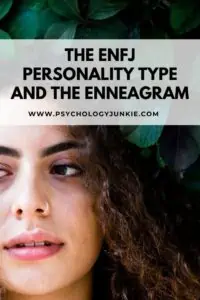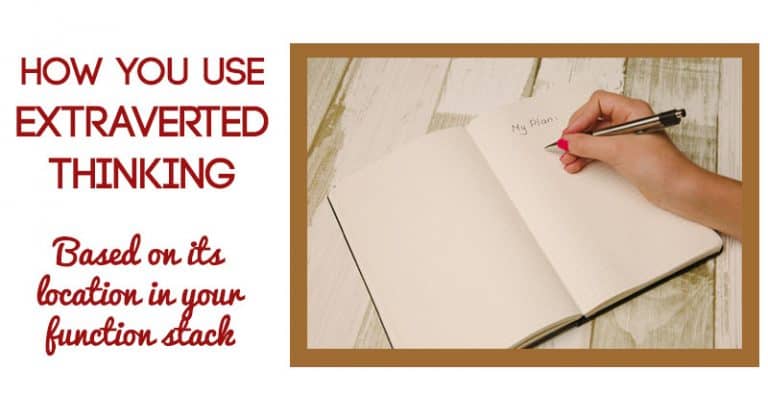The ENFJ Personality Type and the Enneagram
Have you ever wondered why there are many different varieties of ENFJs out there in the world? Some ENFJs are bubbly and supportive, going out of their way to give to others. Other ENFJs have blustery tempers and strive to be independent and uncontrolled. Why are there so many unique varieties of ENFJs? What causes these differences? Well, in many cases, these differences stem from different Enneagram types within the ENFJ personality type.
As with all typology systems, the MBTI® can only tell us a fraction of information about who we are. The information you gather from the world around you and the information you prioritize in decision-making are all influenced by your Myers-Briggs® personality type. But your Enneagram type can tell you what your core fears are, your driving motivations, and the wounds you experienced in childhood.

Today we’re looking at nine different varieties of ENFJs using the Enneagram as a way to add nuance to your personality understanding. I hope you’ll reach a whole new level of self-understanding through this!
This article contains affiliate links to books on Amazon. If you purchase one of these books, I get a small kickback that I can use to pay for hosting and other demands of this site. I only recommend books I love.
Not sure what your personality type is? Take our new personality questionnaire here. Or you can take the official MBTI® here.
Table of contents
Estimated reading time: 18 minutes

The Nine Enneagram Types of the ENFJ
The ENFJ Enneagram One Type
Core Fear: Being corrupt, evil, or “bad”
Core Desire: To be good and to have integrity
ENFJ Ones have an intense desire to reach their ideals and to live a life that aligns with their values. They want to be the best version of themselves and are easily prone to perfectionism. Yet this drive to be good is not motivated by the need for esteem or praise, it’s an intrinsic need within themselves that needs to be fulfilled. These ENFJs have a strong moral code and are concerned with ways of life that are “right” or “wrong.” They are the ultimate idealists; they don’t want to just imagine a better world, they want to go out and make that better world a reality. Typically busy and industrious, they are often helping out in their communities, speaking out against injustice, and giving up their time in service of the greater good. While they still maintain the warmth typical of ENFJs, they have a stricter and more judicious side than the typical ENFJ.
Unfortunately, ENFJ Ones can be very tough on themselves. They have an inner critic that puts them down, criticizes any flaw in themselves or others, or holds them to impossibly high standards. The healthier the One is, the more they’re able to recognize that that voice isn’t “God” or even the truth. They can hear the voice and respect it without believing it or giving it a tremendous amount of power in their lives. Thus they become more accepting and tolerant of themselves and others. The unhealthier the One is, the more power they give this inner critic, and thus they become judgmental of themselves and others and can become condemning, self-righteous, and judgmental.
Because Ones are in the Instinct/Body triad of the Enneagram, they experience a lot of instinctive rage or anger. Yet they attempt to repress it because they feel it is a “bad” emotion and one that must be controlled. Thus their anger slips out in critical comments, judgmental remarks, or physical tension like a tight jaw or clenched fists.
Unhealthy Ones Can Be: Self-Righteous, Bitter, Judgmental, Overworked, Defensive, and Prone to Black-and-White Thinking, Hypocritical. They are often overwhelmed by a nagging fear that they will never be “good enough.”
Average Ones Can Be: Serious, Driven, Purposeful, Scheduled, Judicious, Organized, Tense, Opinionated, Sarcastic, Hard-Working, Dedicated, Responsible.
Healthy Ones Can Be: Sensible, Grounded, Understanding, Tolerant, Objective, Accepting, Hopeful, Wise, Discerning, Joyful, Empathetic, Humble, Playful.
The ENFJ Enneagram Two Type
Core Fear: Of being worthless, unwanted, or unlovable.
Core Desire: To be loved for who they are.
The Two is a fairly common Enneatype for the ENFJ. Driven to serve and get the needs of the people around them met, these types embody the word “caring.” ENFJs are known for being insightful about people and quickly able to read the emotional needs of anyone fairly quickly. When combined with the Two Enneatype, these individuals can feel like mind-readers in a sense. They are emotionally in tune with the world around them and can accommodate people’s feelings without having to be asked. Deeply concerned with how people feel, they are cognizant of the unspoken social contracts that are expected of them.
The struggle for ENFJ Twos is often that they refuse to ask for help when it comes to their own needs. Average to unhealthy Twos believe that they can and should help others, yet to be in need and to ask for help feels like a slight to their pride and thus they may refrain from doing so. That said, they still want people to be able to anticipate their needs in the same way they do for others. This is rarely done, however, and many ENFJ Twos find themselves burned out and exhausted by serving others and getting little in return for it. The healthier the Two is, the more likely they are to ask for help, prioritize their own well-being, and understand and implement healthy boundaries.
In childhood, ENFJ Twos were taught to put others’ before themselves. Selflessness was praised or even preached to them. Over time it became difficult for them to set healthy boundaries, and they often believed that they had to earn the affection of others through selfless acts. As dominant feeling types, they learned to read others’ emotions and prioritize them above their own. They hoped by being helpful, generous members of the family, they would earn their place (and the love of others).
Because Twos are in the Heart triad of the Enneagram, they experience underlying issues with shame. They worry that if they don’t serve or give enough that they will lose their relationships or be worthless. On the flipside, they sometimes experience pride because they think that others wouldn’t be able to make it without them.
Unhealthy Twos Can Be: Attention-Seeking, Desperate, Clingy, Victim-Minded, Overbearing, People-Pleasing, Manipulative, Over-worked, Hurt, Exhausted, Insecure, Prideful.
Average Twos Can Be: Proud, Selfless, Caring, Well-Intentioned, Complimentary, Supportive, Helpful, Nurturing Flattering, Insecure, Responsible, Possessive.
Healthy Twos Can Be: Expressive, Compassionate, Generous, Self-accepting, Joyful, Humble, Imaginative, Creative, Supportive, Insightful. They prioritize themselves rather than always putting others first.
The ENFJ Three Enneagram Type
Core Fear: Of being worthless without success or achievement.
Core Desire: To feel desired, accepted, and successful.
Goal-oriented and motivated, ENFJ Threes are driven by their visions and have a pressing need to stay busy. They quickly understand where they stack up amongst their friends and colleagues and strive to be capable, successful, and to stand out in some way. Many times they align their version of success with their ideals; working towards a better future or drawing people towards a cause that matters to them. Some simply want to be the best at whatever job they pursue, be it a bank teller or a motivational speaker! Regardless of their chosen profession, they will try to do it to their utmost strength and they’ll use their time and energy in the pursuit of excellence. These ENFJs remind us that we’re all capable of great things when we set our hearts and minds to the work.
ENFJ Threes often feel bogged down by the idea that there’s never an end to all their striving. No matter how much they accomplish there will always be another goal to reach and another dream to make real. They are prone to burnout and can forget themselves in pursuit of their version of success. It’s crucial that these Threes figure out what makes them truly happy; not just what adds to their success. However, introspection and self-examination often take a backseat to hard work and accomplishment for Threes.
In childhood, ENFJ Threes often felt unvalued for who they were. They were given the impression that only by winning or achieving would they be valued or truly loved. Any form of praise gave them a boost of validation, and they found themselves anxiously trying to achieve and strive harder in order to keep that validation coming. On the outside, they may look materialistic. They enjoy gathering symbols of their success, be it actual trophies or just a good car and a nice wardrobe. They worry that without these tokens of success they may be a failure or people will not truly value them. Ideally as they mature through life, they learn the importance of developing integrity and happiness rather than material items.
Because Threes are in the Heart triad of the Enneagram, they tend to experience issues with shame. Yet unlike the Two or Four, Threes are often out of touch with their feelings. As ENFJs, they are highly attuned to others’ feelings but are less conscious of their own. The goal is to succeed, to strive, to achieve. Reflecting on their own emotions can feel like a “waste of time” to them until they reach a healthy level of maturity.
Unhealthy Threes Can Be: Depressed, Arrogant, Insecure, Empty, Angry, Attention-Seeking, Confused, Vain, Deceitful, Competitive, Burned-Out, Guarded.
Average Threes Can Be: Over-Achievers, Arrogant, Ambitious, Self-Doubting, Self-Promoting, Competitive, Visionary, Hard-Working, Creative, Determined, Restless.
Healthy Threes Can Be: Imaginative, Inspiring, Confident, Creative, Genuine, Self-accepting, Benevolent, Visionary, Insightful, and/or Empathetic. These threes explore their true identity and discover what they actually want rather than what society labels as “success.”
The ENFJ Four Enneagram Type
Core Fear: Of being insignificant or without identity.
Core Desire: To find their own significance or identity.
ENFJ Fours are rare and often seem more quiet and introspective than the average ENFJ. There’s an expressiveness and insight to these Fours that sets them apart. In turn, they are often drawn to artistic pursuits and the dramatic arts. More melancholy than many ENFJs, these individuals often sense what is missing in their lives, what is flawed within them, and how they are different from others. They see richness and beauty in sadness, and in being different, but that doesn’t mean it doesn’t cause them pain. Deep down they wish they could find someone to be their true friend and confidante, but they often struggle to find people to genuinely connect with. Emotionally rich and in tune with the feelings of others, they crave authentic, raw, intimate moments. They want to know what’s behind the façade of others and peer more deeply into their souls. Any situation, no matter how bleak, can be filled with profound beauty and emotional depth to them.
In childhood, Fours often felt misplaced in their families; as if they weren’t understood. This may have been unintentional from the parents, but the impression was there just the same. Thus they focused on what made them different, and tried to brave through the darkness of their feelings in order to cope. Finding their identity became their life goal as a way to make peace with the melancholy and loneliness that came from feeling so different.
Fours are in the Shame/Heart triad of the Enneagram. Because of this, they have underlying issues with shame. Yet unlike the other two types in the heart triad, they face their shame and dig into it as deeply as they can. For the Four it can be important not to become overwhelmed by shame and to honor their strengths, realizing that feelings aren’t always accurate – and sometimes those melancholy feelings of rejection aren’t the truth.
Unhealthy Fours Can Be: Self-destructive, depressed, unrealistic, self-loathing, self-sabotaging, wasteful, apathetic, envious, listless, exhausted, and/or lost in fantasies.
Average Fours Can Be: Imaginative, self-conscious, melancholy, introspective, envious, aesthetically motivated, self-absorbed, sensitive, empathetic, and/or visionary.
Healthy Fours Can Be: Creative, eloquent, authentic, imaginative, insightful, honest, forgiving, revealing, empathic, accepting, and grateful. They don’t feel a need to be different – they know that there is only one of them and they are good as they are.
The ENFJ Five Enneagram Type
Core Fear: Being helpless, incompetent, or overwhelmed.
Core Desire: To be competent and capable.
The Five is an especially rare type for the ENFJ to identify with, but it does happen on occasion. ENFJ Fives are more detached, aloof, and protective of themselves than the average ENFJ. They hope that by possessing enough information and data that they can feel safe in the world. There’s a sense that they’re “not ready” to be out in the world and taking action; they must learn more first. These ENFJs are typically more in touch with their Introverted Thinking side than the average ENFJ. They exhaustively test themselves and their ideas to see if they can stand up to scrutiny. Many times they experience chronic stress as a result of being more detached from others and the emotional intimacy they crave.
ENFJ Fives feel a push and pull between wanting to connect with others (through Extraverted Feeling) and pull away (due to their Five tendencies). Becoming overwhelmed by others is a real fear and they hate being barged in on or having excessive interpersonal demands placed on them. At the same time, as ENFJs they want to live in an atmosphere of emotional harmony and connection. The people they do devote their time and energy to they are deeply loyal to and will go out of their way to nurture.
In childhood, ENFJ Fives often felt that they weren’t secure or safe in some way. This safety may not have been related to neglect or anything extreme. They could have felt emotionally overwhelmed by their families or their lifestyle could have felt unstructured and chaotic. As Judgers, ENFJs like having a clearly defined set of schedules and rules and expectations. But if the family was disorganized and disruptive, they may have retreated into themselves. In solitude, they wouldn’t have to worry about being overwhelmed by people’s unpredictability or emotional outbursts. In private they could delve into their insights, imagine, and learn about whatever subject sparked their interest.
Fives are in the Head/Fear triad of the Enneagram. They cope with their fear by withdrawing and gathering information. The more they know, the more they believe they can confront their fears with competence.
Unhealthy Fives Can Be: Aloof, eccentric, insomniacs, stuck in analysis-paralysis, afraid, reclusive, secretive, under-nourished, fearful, removed from their feelings, and/or argumentative.
Average Fives Can Be: Cerebral, insecure, high strung, secretive, private, skeptical, resentful, imaginative, creative, private, pre-occupied, conceptual, observant, and/or intelligent.
Healthy Fives Can Be: Competent, strong, profound, curious, original, artistic, inventive, original, independent, clear-minded, grounded, compassionate, engaged, perceptive, and/or productive.
The ENFJ Six Enneagram Type
Core Fear: To be abandoned and without support.
Core Desire: To find support and security.
The ENFJ Six is highly focused on potential threats and circumventing possible risks. More cautious than the average ENFJ, they question themselves and look for authorities or empirical evidence and research to guide them (sometimes they trust religious leaders, sometimes actual scientific authorities). Community builders at heart, these Sixes bring people together and try to create support systems for themselves and others. They are often at the heart of community outreach programs and are hardworking and dedicated to whatever vision they set out for themselves and the people on their team.
Many people initially think that ENFJ Sixes are accepting of authority and avid rule-followers. But they do have a rebellious side as well! Some Sixes are very defiant of authority and are willing to go down fighting against anyone who hasn’t earned their trust; testing, confronting, and questioning. Other Sixes are outwardly respectful of authority and meeker, but they are often secretly filled with the same questions and skepticisms of the more overtly outspoken Six.
In childhood, many Sixes felt as if they were unsafe and didn’t have adequate protection. Even if their childhoods were reasonably safe they sensed dangers everywhere that were not being dealt with. As a result, they learned early on to keep their eyes open to potential threats and to have a conflicted relationship with authority.
Because Sixes are in the Head/Fear triad, they grapple with underlying issues with anxiety. They have difficulty trusting their own minds and they look outside themselves for guidelines, communities, or authorities that feel unshakable. This is a conflict for them, however, because they are also afraid of trusting in anything or anyone that might let them down. Because of this, especially at average to unhealthy levels, they feel constantly insecure. Once Sixes reach healthy levels of maturity they learn to trust their instincts and form lasting bonds and relationships with others.
Unhealthy Sixes Can Be: Plagued by guilt, delusional, self-punishing, self-destructive, paranoid, insecure, obsessed with fears, testy, helpless, panicky, and depressed.
Average Sixes Can Be: Supportive, indecisive, authority-seeking, authority-questioning, anxious, pessimistic, cautious, cynical, skeptical, impulsive, dutiful, and/or hard-working.
Healthy Sixes Can Be: Responsible, practical, committed, grounded, well-disciplined, insightful, visionary, friendly, trustworthy, hard-working, serene, and brave.
The ENFJ Seven Enneagram Type
Core Fear: Of being in pain, trapped, or deprived
Core Desire: To be happy, satisfied, and have their needs fulfilled
Cheerful, fun-loving, and imaginative, ENFJ Sevens see positive potential everywhere around them. Often inspiring and visionary, they cast a picture of a better world or an enlightening experience and beckon others to join them. They are more risk-taking than many ENFJs, refusing to accept limitations and stopping at nothing to live life to the fullest. Yet underneath their bubbly, adventurous exterior, they often have issues with anxiety. As part of the head/fear triad they often have a fear of being trapped and of not getting their needs met. The more they stay busy and pursue new ideas and pursuits the less they have to sit with painful emotions or memories. Being constantly busy and entertained helps them to focus on the positive, but it can also lead them to be less self-aware than they should be. Sevens are gifted at reframing negative situations in a positive light. Sometimes this is good, yet other times it can make them neglectful of serious issues.
In childhood, Sevens often felt a distance between themselves and the nurturing figure in their life (often the mother, but not always). To cope, they sought nurturance and contentment through distractions: toys, games, activity, or laughter. Even in adulthood, Sevens seek out objects and distractions to help them repress feelings of separation, hurt, and anguish. The gap that Sevens feel between themselves and their mother may not have been caused by anything intentional or severe. As an example, another baby might have been born and needed more attention.
Unhealthy Sevens Can Be: Escapists, Hedonistic, Reckless, Joyless, Childish, Scattered, Unstable, Overwhelmed, Attention-Seeking, Impulsive, Paralyzed.
Average Sevens Can Be: Impatient, Imaginative, Creative, Excessive, Enthusiastic, Distracted, Adventurous, Materialistic, Restless, Self-Centered, Skilled at Multi-Tasking.
Healthy Sevens Can Be: Satisfied, Grounded, Bold, Visionary, Realistic, Charismatic, Appreciative, Joyful, Helpful, Profound.
The ENFJ Eight Enneagram Type
Core Fear: Being controlled or violated
Core Desire: To pave their own way in life and to protect themselves.
Eight is one of the rarest Enneatypes for ENFJs. Known for being empathetic and community-centered, Eights instead crave autonomy and hate feeling tied down to anything outside themselves. Assertive and charismatic, these ENFJs are more outspoken about their values and more willing to start a conflict if it will lead to a spark of emotional understanding or be persuasive in getting people to align with a cause. Many Eights are skeptical of authority and hate being told what to do or how to live their lives; while they are often leaders in causes or movements, they are rarely followers.
ENFJ Eights will appear more socially aware, gregarious, or warm than most Eights. They believe in protecting the underdogs, fighting for their values, defending justice, and speaking out against anything that defies their deeply-held values. Often they are confrontational and aggressive towards people who seem like a threat to their loved ones. Since they have such awareness of other peoples’ feelings, they can use that to their advantage and navigate hostile emotional territory with finesse; appearing charismatic and even intimidating, but doing it in a way that resonates with someone in a deeper emotional sense.
Eights are in the Body/Anger triad of the Enneagram. Rather than trying to stifle their anger (like the One), they express their anger outwardly. However, they are more emotionally in tune with others and aware of which buttons their pressing, rather than tactlessly exploding on people without knowing how they’re affecting anyone.
Unhealthy Eights Can Be: Destructive, Bossy, Rejecting, Vengeful, Aggressive, Private, Hardened, Authoritative, and/or Confrontational.
Average Eights Can Be: Resourceful, Competitive, Businesslike, Boastful, Willful, Proud, Bad-tempered, Independent, Hard-Working, Protective and/or Determined.
Healthy Eights Can Be: Courageous, Heroic, Forgiving, Energetic, Independent, Action-Oriented, Resourceful, Direct, Protective, Inspiring, Generous, Strategic, Decisive, Self-Confident, and/or Authentic.
The ENFJ Nine Enneagram Type
Core Fear: Fragmentation, loss, or separation
Core Desire: To have inner peace of mind and harmony
Nine is a fairly common type for ENFJ. Empathetic and nurturing, these types seek a harmonious life with empathic connections and imaginative interplay. They see beauty in everything and are often daydreamers, visionaries, and confidantes. Their conscientious, supportive nature makes them a favorite among friends, who feel that they can share anything with them without fear of judgment or harsh reprimands.
The ENFJ Nine may seem more outspoken than other Nines. Even though they crave tranquility and harmony, they are still extroverted types who want to stand for a value or cause or bring about connection with people. If they feel that someone is disrupting the harmony of the group or violating a deeply-held value, they’re likely to stand up and say something about it. However, when things are even-keeled and calm they prefer it. In fact, they may not say what they want in certain situations because they don’t want to cause a rift or rock the boat. It takes time for them to learn to feel comfortable expressing their true needs and desires because they often give them a backseat for the desires and wishes of others.
In childhood, Nines learned that the best way to handle turmoil in their environment was to “numb out” or emotionally vacate. They practiced early on dissociating from threatening or disruptive events and making themselves low-maintenance so they wouldn’t bother anyone or make things worse. They felt that if they asserted themselves or became angry they would only make things worse. So they stayed in the background, repressed their feelings, their will, and their desires.
While on the outside ENFJ Nines might seem easy-going and unphased, they often build up a great deal of resentment and anger and eventually will “snap” if they never learn to process their feelings in healthy ways. Like Eights and Ones, Nines are in the Body/Anger triad. But while Eights express their anger, Nines try to numb themselves to it (until they inevitably explode). Friends and family members may be shocked when the generous, easy-going Nine lashes out unexpectedly once their patience has boiled over.
Unhealthy Nines Can Be: Withdrawn, Ineffectual, Depressed, Unrealistic, Dissociated, Disoriented, Numb, Helpless, Lazy, Repressed, Neglectful, and/or Listless.
Average Nines Can Be: Agreeable, Compassionate, Disengaged, Amicable, Open-Minded, Deflecting, Resigned, Appeasing, Complacent, Dismissive of Pain.
Healthy Nines Can Be: Patient, Level-Headed, Imaginative, Present, Dynamic, Inspiring, Self-Possessed, Serene, Easy-Going, Kind, Patient, Peaceful, Comforting, and/or Spiritual.
Other Articles You Might Enjoy:
Healthy vs. Unhealthy Enneagram Types









Thank you for this Susan! Perhaps an ENFJ who is an Enneagram 4 is mistyped as an ENFJ? So much of the ENFJ cognitive stack seems incompatible with being an enneatype 4! I tested once as an INFJ on an official MBTI test, but upon researching the INFJ cognitive stacking deeply found that I resonated better with the ENFJ cognitive stack. But still something was missing, and the Enneatype 4 description seems to nail it.